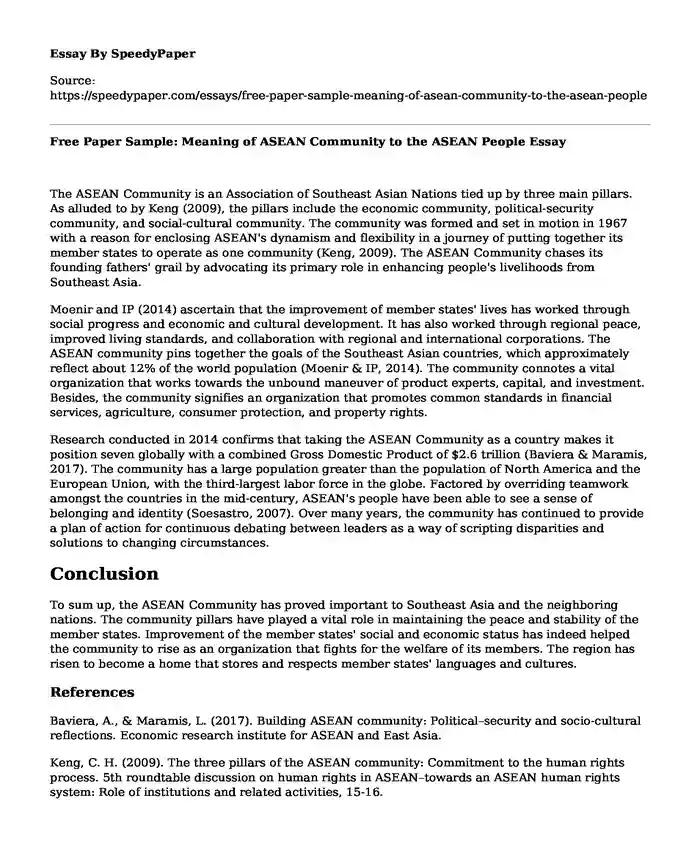The ASEAN Community is an Association of Southeast Asian Nations tied up by three main pillars. As alluded to by Keng (2009), the pillars include the economic community, political-security community, and social-cultural community. The community was formed and set in motion in 1967 with a reason for enclosing ASEAN's dynamism and flexibility in a journey of putting together its member states to operate as one community (Keng, 2009). The ASEAN Community chases its founding fathers' grail by advocating its primary role in enhancing people's livelihoods from Southeast Asia.
Moenir and IP (2014) ascertain that the improvement of member states' lives has worked through social progress and economic and cultural development. It has also worked through regional peace, improved living standards, and collaboration with regional and international corporations. The ASEAN community pins together the goals of the Southeast Asian countries, which approximately reflect about 12% of the world population (Moenir & IP, 2014). The community connotes a vital organization that works towards the unbound maneuver of product experts, capital, and investment. Besides, the community signifies an organization that promotes common standards in financial services, agriculture, consumer protection, and property rights.
Research conducted in 2014 confirms that taking the ASEAN Community as a country makes it position seven globally with a combined Gross Domestic Product of $2.6 trillion (Baviera & Maramis, 2017). The community has a large population greater than the population of North America and the European Union, with the third-largest labor force in the globe. Factored by overriding teamwork amongst the countries in the mid-century, ASEAN's people have been able to see a sense of belonging and identity (Soesastro, 2007). Over many years, the community has continued to provide a plan of action for continuous debating between leaders as a way of scripting disparities and solutions to changing circumstances.
Conclusion
To sum up, the ASEAN Community has proved important to Southeast Asia and the neighboring nations. The community pillars have played a vital role in maintaining the peace and stability of the member states. Improvement of the member states' social and economic status has indeed helped the community to rise as an organization that fights for the welfare of its members. The region has risen to become a home that stores and respects member states' languages and cultures.
References
Baviera, A., & Maramis, L. (2017). Building ASEAN community: Political–security and socio-cultural reflections. Economic research institute for ASEAN and East Asia.
Keng, C. H. (2009). The three pillars of the ASEAN community: Commitment to the human rights process. 5th roundtable discussion on human rights in ASEAN–towards an ASEAN human rights system: Role of institutions and related activities, 15-16.
Moenir, H. D., & IP, S. (2014). One identity towards ASEAN community 2015. Social and cultural issues in ASEAN, 219, 217-232.
Soesastro, H. (2007). Implementing the ASEAN economic community (aec) blueprint. soesastro, h. eds, 1-2.
Cite this page
Free Paper Sample: Meaning of ASEAN Community to the ASEAN People. (2023, Nov 05). Retrieved from https://speedypaper.com/essays/free-paper-sample-meaning-of-asean-community-to-the-asean-people
Request Removal
If you are the original author of this essay and no longer wish to have it published on the SpeedyPaper website, please click below to request its removal:
- Free Essay Sample Comparing Travel Agents vs. Online Ticketing
- Japanese Art: From Refined to Revered in Five Decades. Essay Sample
- Essay Example on Hotel Industry in Singapore and Immigrants
- Free Essay. Factors That Made the Inhabitants Cooperate With the European Empires
- COVID-19 Impact on Tourism: A Segmentation Analysis - Essay Sample
- Essay Sample on Aboriginal and Torres Strait Islander Ethics Research
- Health Issues in Botswana - Free Essay Example
Popular categories





